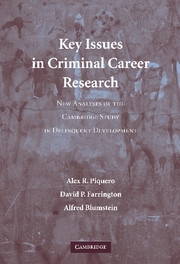 Key Issues in Criminal Career Research
Key Issues in Criminal Career Research Book contents
- Frontmatter
- Contents
- Foreword by Charles F. Wellford
- Acknowledgments
- 1 Introduction
- 2 Overview of Criminal Careers
- 3 Overview of CSDD Data
- 4 How Do Prevalence and Individual Offending Frequency Vary with Age?
- 5 How Does Onset Age Relate to Individual Offending Frequency?
- 6 How Does Specialization/Versatility Vary with Age?
- 7 Comparing the Validity of Prospective, Retrospective, and Official Onset for Different Offending Categories
- 8 What Is the Role of Co-offenders, and How Does It Vary with Age?
- 9 Are Chronic Offenders Serious Offenders, and Does This Relationship Vary with Age?
- 10 Trajectories of Offending
- 11 Developing Estimates of Duration and Residual Career Length
- 12 A Summary and an Agenda for Future Research
- References
- Index
- Titles in the series
12 - A Summary and an Agenda for Future Research
Published online by Cambridge University Press: 30 July 2009
- Frontmatter
- Contents
- Foreword by Charles F. Wellford
- Acknowledgments
- 1 Introduction
- 2 Overview of Criminal Careers
- 3 Overview of CSDD Data
- 4 How Do Prevalence and Individual Offending Frequency Vary with Age?
- 5 How Does Onset Age Relate to Individual Offending Frequency?
- 6 How Does Specialization/Versatility Vary with Age?
- 7 Comparing the Validity of Prospective, Retrospective, and Official Onset for Different Offending Categories
- 8 What Is the Role of Co-offenders, and How Does It Vary with Age?
- 9 Are Chronic Offenders Serious Offenders, and Does This Relationship Vary with Age?
- 10 Trajectories of Offending
- 11 Developing Estimates of Duration and Residual Career Length
- 12 A Summary and an Agenda for Future Research
- References
- Index
- Titles in the series
Summary
This final chapter integrates the main findings of the book and summarizes the “take-home” messages from the various chapters. Based on these findings, we then highlight five key priorities for future criminal career research. We readily forewarn readers that we outline a very ambitious agenda and ask difficult research questions, but we believe that the data brought to bear on those questions will open new doors for theoretical, empirical (both quantitative and qualitative), and policy research. We conclude by outlining the next 40 years of the CSDD.
Before we present these findings, we would like to take stock of the motivation behind this book. Quite frankly, we were struck by the level of agreement about some key criminal career facts that many criminologists share (e.g., Farrington, 2003). At the same time, many other observations made by criminal career researchers over the past several decades have resulted in contentious exchanges on key questions that remain contentious and/or understudied (see Sampson and Laub, 2005a, b). In particular, we identified a number of issues that we sought to address using data from the CSDD, a longitudinal study of 411 South London males followed to age 40. Although we cannot hope to answer every question in excruciating detail, we do believe that, when taken together, the results presented in this book provide a very comprehensive, descriptive portrait of the criminal careers of these men. Now, what did we ask and what did we learn about these contentious criminal career issues?
- Type
- Chapter
- Information
- Key Issues in Criminal Career ResearchNew Analyses of the Cambridge Study in Delinquent Development, pp. 199 - 217Publisher: Cambridge University PressPrint publication year: 2007


